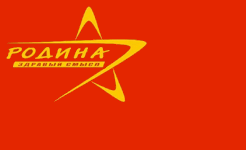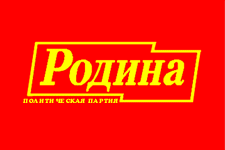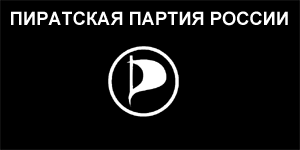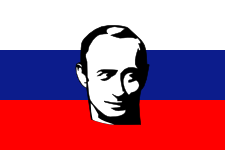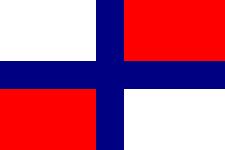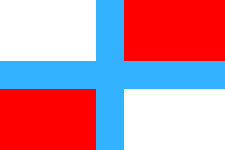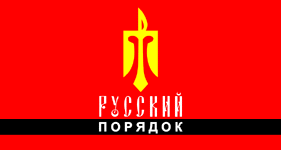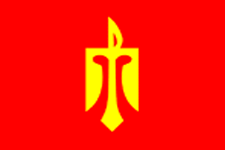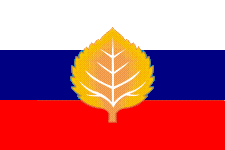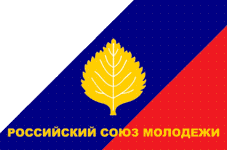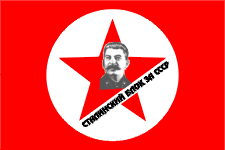Political flags of Russia (original) (raw)

This page is part of © FOTW Flags Of The World website
Last modified: 2025-01-18 by rob raeside
Keywords: politics | [red cross-road](keywordr.html#red cross-road) | [self-governing workers](keywords.html#self-governing workers) | [hammer and sickle: no star (golden)](keywordh.html#hammer and sickle: no star %28golden%29) | [cross: assymetric](keywordc.html#cross: assymetric) | [krasnyĭ perekrestok](keywordk.html#krasnyĭ perekrestok) |
Links: FOTW homepage |search | disclaimer and copyright | write us | mirrors
On this page:
- Homeland Party (RGU) - Родина
- Indivisible Nation of Russia - Единая нация России
- Pirate Party
- Putin Club
- Red Cross-Road - Красный перекресток
- Russian Citizens� Union
- Russian Order
- Russian Popular Front - Российский народный фронт (early 1990s)
- Russian Youth Union
- Stalinist Bloc - For the USSR - Stalinskii blok - za SSSR | Сталинский блок - за СССР (1999) On other pages:
* Mainstream Russian Political Parties:
- Yabloko Party
- Civic Force
- Communist Party of Russian Federation
- Democratic Party of Russia
- Liberal Democratic Party of Russia
- New Left
- Our home is Russia Party
- People’s Democratic Union
- Russia’s All-people Union
- Russian Federation People’s Party
- Social-Democratic Party of Russia
- United Citizen’s Front
- Young Guard of United Russia
- Russian Trade Unions:
- Confederation of Labour of Russia
- Russian Trade Union of Workers of Chemical Industries
- Society of Merchants and Industrialists of Russia
- Federation of Independent Trade Unions
- Russian Regional Political Parties:
- Bashkor Popular Party
- Far-Eastern Republican Party
- Unofficial Autonomist flags of 1992-1993
- Ural Transformation movement
- Russian Non-parliamentary Political Parties and Movements:
- 5th of December Party
- Agrarian Party of Russia
- Association of Free Socialists-Anarchists (ASSA)
- Civic Movement "Resistance"
- Democratic Choice
- Euro-Asian Youth Union
- Gone together
- Left Socialist Action
- Nashi
- National Bolshevik Front
- National Bolshevik Party
- National Socialist Revolutionary Movement "Black Sun"
- New Course/Automobile Russia Party
- Oborona
- Progress Party
- Republican Party of Russia � People's Freedom Party
- Russian Heathens' Front
- Russian Socialist Movement
- Russian ultra-rightist political groups - including neo-Nazi groups
- Union of Rightist Forces
- Miscellaneous Russian Political Organizations:
- Anti-Nuclear Society of Tataria
- Roerich Movement - International Banner of Peace
- Military political movements in Russia
- Russia-Belarus merger proposal flags
- Imperial flag - modern usage
- Opposition to Vladimir Putin flag
- Z flags
See also :
Homeland Party 2003-2006
Rodina - Narodno-Patrioticheskiy Soyuz | Родина
The party is called Rodina (Motherland, Homeland). They back the Kremlin on certain issues. A flag, I have not seen yet, since this is a new party.
Zach Harden, 08 Dec 2003
Possiable Variant (not documented)
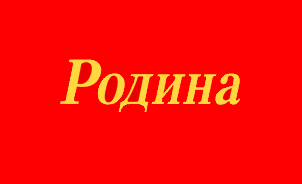 image by Pete Loeser, 14 August 2012
image by Pete Loeser, 14 August 2012
Rodina was a coalition of 30 nationalist and left-wing groups. In the 2003 Duma elections, they won 37 of the 450 seats in the Duma. Rodina then merged with the "Russian Party of Life" and the "Russian Pensioners´ Party" to form a new party named "A Just Russia" in 2006. This variant flag is based on memory of a news report I once saw, but can't locate anymore, and as such is not documented. The main difference between this remembered RGU variant and other reported ones was there was no stepped gold outline around the word " POДИНА" on this flag.
Pete Loeser, 16 August 2012
Indivisible Nation of Russia
Единая нация России
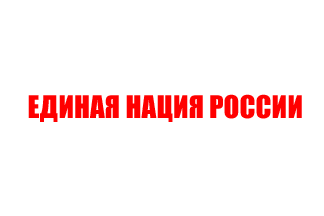 image by Victor Lomantsov, 18 Apr 2003
image by Victor Lomantsov, 18 Apr 2003
According to the party statutes of the "Indivisible Nation of Russia," its emblem is simply its name written in red capital letters (font is Impact/Cyrillic) across a white background. Its flag is identical with the red text centered on a white field.
Victor Lomantsov, 18 Apr 2003
Pirate Party
Putin Club
Red Cross-Road
Красный перекресток
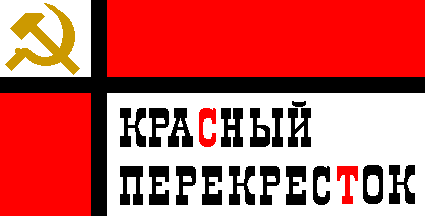 image by António Martins, 08 July 1999
image by António Martins, 08 July 1999
This flag is from www.aha.ru/~intcentr/,
Dov Gutterman, 22 March 1999
Probably belongs to one marginal pro-communist organisation "Red Cross-road" (the meaning of the inscription). I’ve never heard of that organisation and have never seen the flag as well. The host of the site is the International Center for Forming of the Communist Doctrine.
Alexei Arkhipov, 22 March 1999
The mixing of tsarist symbols (Peter’s alternate naval flag), hammer and sickle and red-white-black might suppose a neo-Nazi (or “fascist”, as they’re called here) party or group, a fringe group of Soviet nostalgic nationalists (and hence the saloon style lettering certainly isn’t an US connection) but I’m not sure. None of the russians whom I asked knew this one. (I also have no idea why "s" and "t" are red while the other letters are black.)
António Martins, 08 July 1999
Russian Citizens� Union
Русский Гражданский Союз
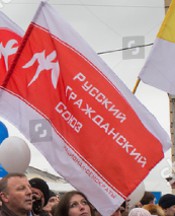 image located by William Garrison, 16 February 2024
image located by William Garrison, 16 February 2024
Source:https://www.shutterstock.com/image-photo/st-petersburg-russia
Flag seen at demonstration "For Fair Elections", led by opposition politics Aleksey Navalny (democracy advocate, suspiciously died Feb. 16, 2024), Garry Kasparov (chess master, democracy advocate) and Sergey Udaltsov (anti-Putin advocate) on February 25, 2012, in St. Petersburg, Russia.
William Garrison, 16 February 2024
The flag reads "Русский Гражданский Союз", which means "Russian Citizen Union".
Ant�nio Martins-Tuv�lkin, 17 February 2024
Russian Order
Russian Popular Front (RPF)
Российский народный фронт | Rossiĭskiĭ Narodnyĭ Front
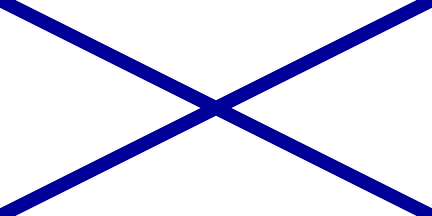 image by Jorge Candeias, 03 April 2003
image by Jorge Candeias, 03 April 2003
The number 177 of Vida Soviética [official Soviet information abroad magazine in Portuguese], of April, 1990, one of the last issues published before the split of the USSR, had an article about Strengths and weaknesses of Russia, examining the position of Russia within the Union and its potential. It’s illustrated by a number of photos, but only one of them has vex content, showing what seems to be a demonstration of a small group of people within a political organization called Russian Popular Front (Российский Народный Фронт), that fly a flag, probably the flag of that organization: The flag is very light, probably white, with a very narrow dark saltire.
Unfortunately, the article doesn’t give any hint as to the colour of that saltire, but I made an educated guess: since there was, at the time, a historical russian flagthat was white with a blue saltire (later readopted by the independent Russian Federation), and since this group’s name seems to indicate a nationalist tint, I’d bet that the saltire is blue. (It should be always kept clear, however, that this is by no means certain — just a hunch on my part.)
Jorge Candeias, 03 April 2003
It was white with a blue saltire, yes. RPF was founded on March 1989 in Moscow as the "Anticommunist People’s Democratic Movement" (the leader was named Skurlatov), later named the "Movement Fatherland - All Russia".
Mikhail Revnivtsev, 04 Apilr 2006
Russian Youth Union
Stalinist Bloc - For the USSR (1999)
Stalinskii blok - za SSSR | Сталинский блок - за СССР
Four small radical political parties, the largest being “Workers’ Russia”, and Soviet dictator Josef Stalin’s grandson joined forces Sunday as “The Stalinist Bloc”. It was formally launched at a congress in a Moscow hotel Sunday, beneath banners bearing Stalin’s portrait imposed on a Soviet red star.
Jaume Ollé, 28 August 1999, quoting AP
The Stalin Block was a coalition of small communist political parties running in the 1999 Duma elections. It included "The Union" led by G.I. Tikhonov, "Labour Russia" led by Viktor Anpilov, the "Union of Officers" led by Stanislav Terekhov, the "Peoples Patriotic Union of Youth" led by I.O. Maliarov, the "Union of Workers of Moscow", the "Bolshevik Platform" (CPSU), the "Russian Association of Miners Invalids", the "All-Union Communist Party Bolsheviks", the Congress of Soviet Women", the "All Union Society", and the "Vanguard of Red Youth", to name a few. Probably the best known supporter of the short-lived coalition was Yevgeny Dzhugashvili, Stalin's grandson, and a retired air force colonel. The coalition received less than one percent of the vote and immediately fell apart.
Pete Loeser, 14 August 2012
